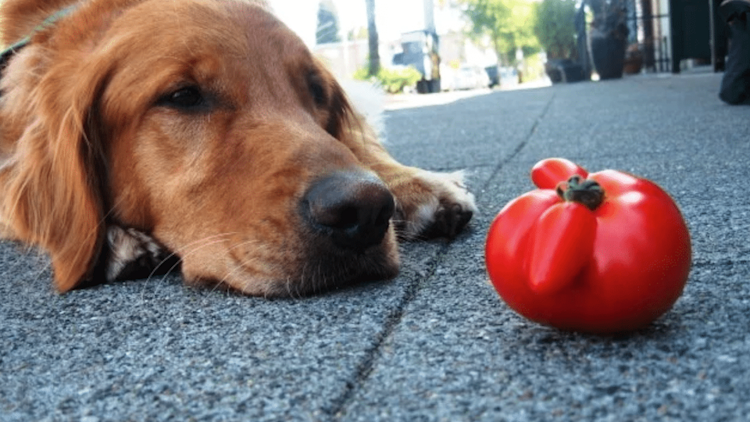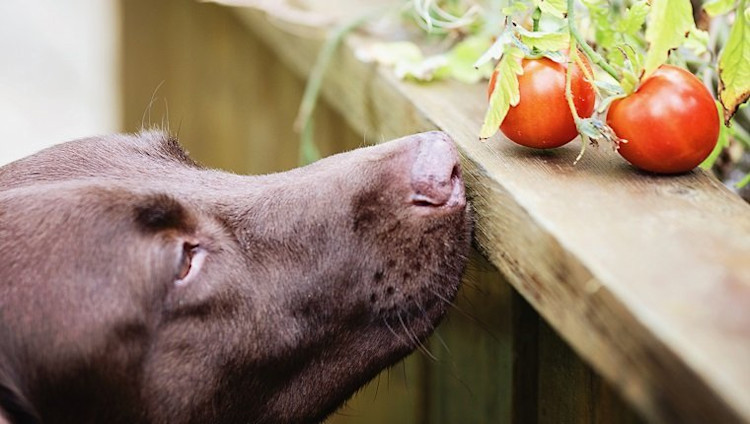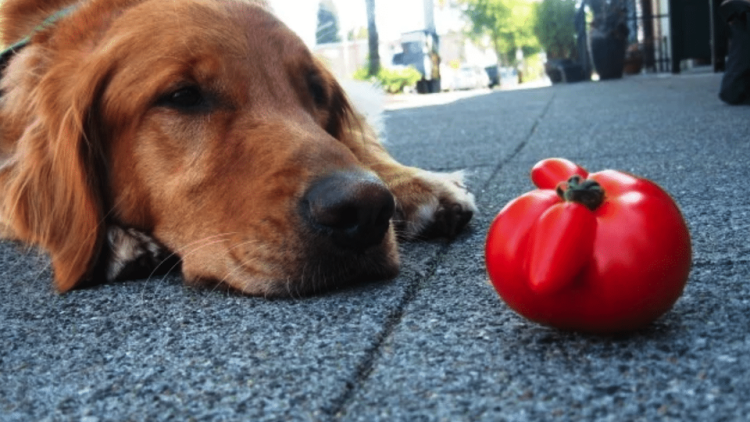Tomatoes are one of the tastiest veggies for humans, but can our canine companions eat them, too? The short answer is yes, dogs can eat tomatoes, as long as their owners understand the risks.
Table of Contents:
- Health benefits of tomatoes for dogs
- Are tomatoes bad for dogs?
- Can dogs have cooked tomatoes?
- Can dogs have cherry and grape tomatoes?
- Can dogs have canned tomatoes?
- What about sun-dried tomatoes?
- How to feed tomatoes to dogs
- Key Takeaways
Pro Tip: Curious dogs can sometimes swallow food that might be dangerous. Pet insurance can help ease the burden of unexpected vet bills from accidents such as poison ingestion. The peace of mind that comes with pet insurance allows you to focus on getting the best treatment for your pet without having to worry about how you are going to pay for it.
Health benefits of tomatoes for dogs
Tomatoes are very rich in nutrients and offer many health benefits for humans that dogs can enjoy, too.
Better eyesight
Many vision problems, like night blindness and cataracts, result from a lack of vitamin A in the diet. Tomatoes are rich in vitamin A and beta-carotene, which help decrease eye-related issues and delay macular degeneration. Beta-carotene is also a powerful antioxidant that prevents oxidative damage and upkeeps a healthy coat and skin.
Enhanced immunity
Ripe tomatoes contain lycopene, a phytochemical that gives them the signature red color and is mostly concentrated in the skin. This plant nutrient is a powerful antioxidant that fights off harmful free radicals and protects cells in the blood, heart, lungs, nerves, and muscles. It also promotes strong bones and reduces the risk of heart disease and stroke.
Healthy coat and skin
Vitamins C and A upkeep a healthy coat and skin, support the immune system, help promote joint health, strengthen the bones, and maintain proper muscle development.
Improved cardiovascular health
Tomatoes also contain high levels of potassium, a mineral known for regulating cholesterol and blood pressure levels, stabilizing neural function, and regulating blood sugar.
Tomatoes are also abundant in iron, which plays an essential role in healthy blood circulation, vitamin K, a fat-soluble vitamin that helps clot the blood, as well as soluble fiber which promotes healthy digestion and regular bowel movements.
 (Image source: CaesarsWay)
(Image source: CaesarsWay)
A few slices of a raw, mature, ripe tomato served in moderation is safe for your dog to eat. In fact, some dog foods include tomato pomace as an ingredient because it is an excellent source of beneficial vitamins and minerals.
Are tomatoes bad for dogs?
Tomatoes belong to the nightshade family of vegetables (also known as Solanaceae). They contain alpha tomatine and solanine, two toxic compounds that are also found in other nightshade plants like eggplants and green potatoes. The highest concentrations of solanine are found in the green parts of the plant: the leaves, stems, and vines.
As with other human foods, there’s a risk that your four-legged friend might be allergic to tomatoes, even if they are ripe. If you notice signs like sneezing, coughing, hives, diarrhea, gas, or itchy rashes, stop feeding your pet tomatoes and contact your veterinarian. In rare cases, an allergic reaction might lead to anaphylaxis, a potentially life-threatening condition. Signs such as swelling, hives, and difficulty breathing can be signs of a severe allergic reaction and should prompt you to seek emergency veterinary care.
Some dogs have medical conditions, like GI issues and acid reflux, that tomatoes might worsen. That’s why it’s best to consult your veterinarian before giving your pet any human foods.
The tomato itself contains high doses of solanine when it is unripe and green. As the tomato ripens, the concentrations of solanine rapidly decrease, which means that your dog can safely eat ripe tomatoes, but should stay away from green ones. If you have a tomato plant in your garden, you should be extra careful as your furry pal might eat the poisonous green parts.
Signs of Tomatine Poisoning
If a dog eats large quantities of the green parts of the tomato plant, they may experience the following symptoms:
- Vomiting
- Diarrhea
- Weakness
- Lethargy
- Loss of coordination
- Confusion
- Loss of appetite
- Hypersalivation
- Dilated pupils
- Drowsiness
- Abnormal heart rate
- Tremors
- Seizures
Pro tip: Accidental poisoning is one of the leading causes for emergency vet visits. If that happens, you’ll want to make sure your dog is covered by a solid pet insurance policy so you know they can receive the best possible care without breaking your budget.
Treatment of tomatine poisoning in dogs
If you notice any of the above-listed symptoms of tomato poisoning, take your dog to the vet right away. Your vet will assess your pet and determine if it is safe and necessary to induce vomiting. This is best done at the veterinary office so that your pet can be closely monitored.
Your vet may also recommend additional treatments, such as fluid therapy, especially if your pet has diarrhea or experiences vomiting, to help the body flush the toxins out and treat the dehydration.
As mentioned before, tomato poisoning in dogs is rare and the prognosis of a full recovery is good. The clinical signs listed above can be a sign of other serious health issues as well, so you should always contact your veterinarian if your pet is exhibiting any of these symptoms.

(Image source: DogTime)
Can dogs eat cooked tomatoes?
Store-bought cooked tomato products that contain tomatoes, like juices, soups, and sauces, might be unhealthy for your canine companion because they often contain sugar, salt, artificial flavors, and other harmful ingredients.
Avoid feeding your dog tomato sauce, especially pasta sauce. These sauces often contain ingredients that could be unhealthy for your pet such as garlic, onions, and chives.
If you want to feed your pet cooked tomatoes, it’s better to stick to fresh ones that you prepare yourself.
When it comes to ketchup, plain is okay but spicy flavors, such as sriracha and jalapeño, should be avoided. Be sure to check the ingredient list on the ketchup bottle. Some ketchup brands might contain xylitol, an artificial sweetener that can be very dangerous for your furry baby.
Can dogs eat cherry tomatoes and grape tomatoes?
There are many different varieties of tomatoes from grape to cherry, and everything in-between. But are any of these varieties more or less toxic to your pet?
The answer is no. Grape tomatoes, cherry tomatoes, beefsteak tomatoes, and other varieties are safe for dogs to consume in moderation as long as they are red and ripe, and the green parts (stems and leaves) have been removed.
Can dogs eat canned tomatoes?
Canned tomatoes are very high in sodium. In large amounts, this can lead to dehydration. It is better to feed ripe, fresh tomatoes.** **If your dog eats canned tomatoes, watch for symptoms such as increased urination, excessive thirst, fever, loss of appetite, and nausea.
What about sun-dried tomatoes?
If the sun-dried tomatoes contain other ingredients (like garlic and onion), you should avoid feeding them to your pet. If there aren’t any harmful ingredients, you can either add one or two finely chopped pieces to your dog’s food or feed them directly from the jar. However, you should take care to feed only a small amount: 1-2 pieces every other day should be enough unless your vet recommends otherwise.
How to feed tomatoes to dogs
If your veterinarian says your dog can eat tomatoes, be sure to choose ripe, red ones and remove the leaves, vines, and stems.
Rinse the tomato well, especially if it’s not organic as non-organic produce is sprayed with pesticides and herbicides that can make your dog sick. Serve the tomatoes to your furry pal fresh and without any additives like salt.
If you serve your canine companion a tomato-based product like soup or sauce, check the ingredient list for ingredients that might be harmful. It’s always better to stick to fresh tomatoes that you prepare yourself.
If you have tomato plants, make sure that your pet cannot access them and eat any unripened tomatoes or green parts of the plants. If you keep a tomato plant indoors, make sure it is in a pot off of the ground. If you are growing tomato plants in your garden or yard, fence the area off.
If your dog still manages to get to the tomato plants, call your veterinarian to discuss the situation. Watch them for the above-mentioned symptoms and call the veterinarian if you have any concerns.
